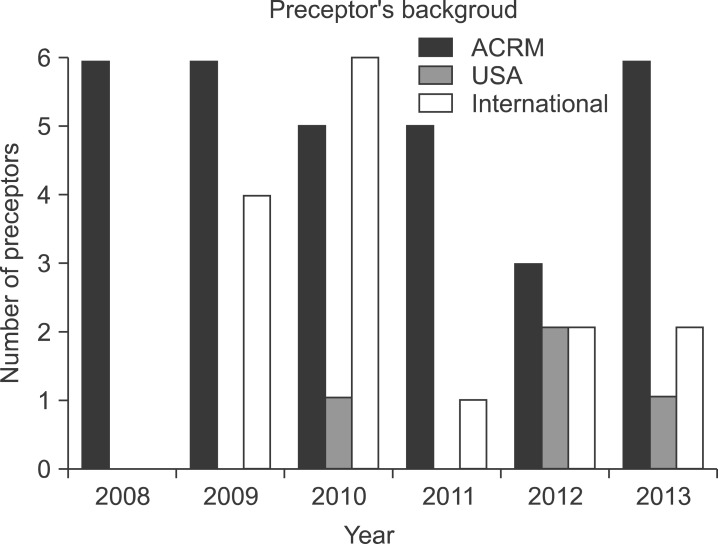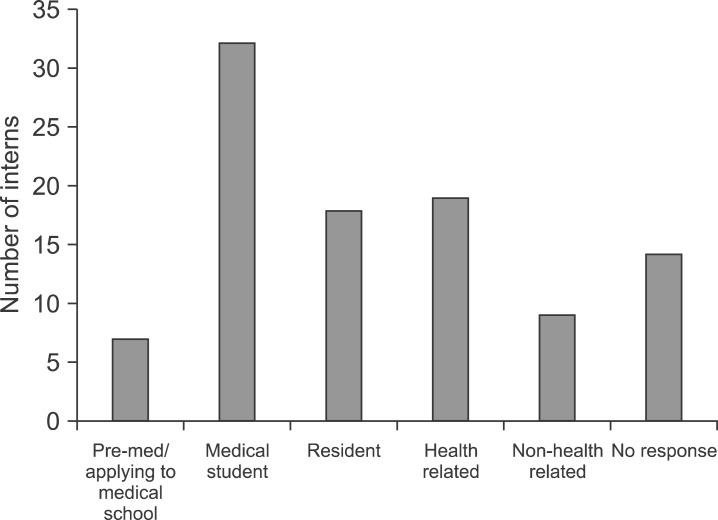World J Mens Health.
2016 Apr;34(1):9-19. 10.5534/wjmh.2016.34.1.9.
Insights into an Award-Winning Summer Internship Program: The First Six Years
- Affiliations
-
- 1American Center for Reproductive Medicine, Glickman Urological and Kidney Institute, Cleveland Clinic, Cleveland, OH, USA. agarwaa@ccf.org
- 2SUNY Upstate Medical University, Syracuse, NY, USA.
- 3Faculty of Medicine, Universiti Teknologi MARA, Selangor, Malaysia.
- KMID: 2162598
- DOI: http://doi.org/10.5534/wjmh.2016.34.1.9
Abstract
- Since its inception in 2008, the American Center for Reproductive Medicine's summer internship program in reproductive research and writing has trained 114 students from 23 states within the United States and 10 countries worldwide. Its fundamental goal is to inspire pre-medical and medical students to embrace a career as a physician-scientist. During this intensive course, established scientists and clinicians train interns in the essential principles and fundamental concepts of bench research and scientific writing. Over the first six years (2008~2013), interns have collectively published 98 research articles and performed 12 bench research projects on current and emerging topics in reproductive medicine. Interns have also developed and honed valuable soft skills including time management, communication and presentation skills, as well as life values, which all enhance personal and professional satisfaction. Program graduates are able to recognize the value of medical research and its potential to impact patient care and gain insight into their own career pathway. Between 2011 and 2014, the internship program was thrice awarded a Scholarship in Teaching Award by Case Western Reserve School of Medicine for its innovative teaching approach and positive impact on medical education and student careers. This report highlights the demographics, logistics, implementation, feedback, and results of the first six years of the American Center for Reproductive Medicine's summer internship program at Cleveland Clinic (Cleveland, OH, USA). This may be helpful to other research and academic institutions considering implementing a similar program. In addition, it creates awareness among potential physician-scientists of what the world of research has to offer in both scientific writing and bench research. Finally, it may stimulate further discussion regarding narrowing the gap between physicians and scientists and refinement of the current program.
MeSH Terms
Figure
Reference
-
1. Wyngaarden JB. The clinical investigator as an endangered species. Bull N Y Acad Med. 1981; 57:415–426. PMID: 6941836.
Article2. Rosenberg L. Physician-scientists--endangered and essential. Science. 1999; 283:331–332. PMID: 9925491.
Article3. Zemlo TR, Garrison HH, Partridge NC, Ley TJ. The physician-scientist: career issues and challenges at the year 2000. FASEB J. 2000; 14:221–230. PMID: 10657979.
Article4. Weinert CR, Billings J, Ryan R, Ingbar DH. Academic and career development of pulmonary and critical care physician-scientists. Am J Respir Crit Care Med. 2006; 173:23–31. PMID: 16179641.
Article5. Moskowitz J, Thompson JN. Enhancing the clinical research pipeline: training approaches for a new century. Acad Med. 2001; 76:307–315. PMID: 11299141.6. Zier K, Stagnaro-Green A. A multifaceted program to encourage medical students' research. Acad Med. 2001; 76:743–747. PMID: 11448834.
Article7. Ley TJ, Rosenberg LE. Removing career obstacles for young physician-scientists: loan-repayment programs. N Engl J Med. 2002; 346:368–372. PMID: 11821517.8. Cluver J, Book S, Brady K, Back S, Thornley N. Engaging medical students in research: reaching out to the next generation of physician-scientists. Acad Psychiatry. 2014; 38:345–349. PMID: 24913099.
Article
- Full Text Links
- Actions
-
Cited
- CITED
-
- Close
- Share
- Similar articles
-
- Measuring Students' Performances and Evaluating the Internship Program for Students Majoring in Food and Nutrition
- Present Status of Dietetic Internship Program in Korea
- Study on the Dietetic Internship Program of Catering Company
- Residency training: training program renewal and evaluation of training
- Implementation of Student Internship with Intern-Level Responsibility



